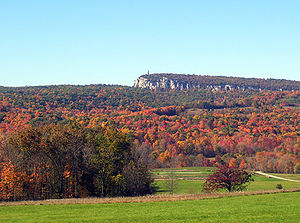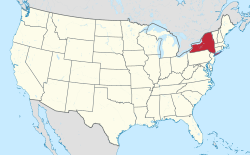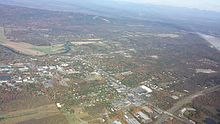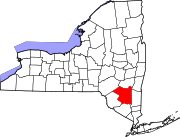New Paltz, New York
| New Paltz, New York | ||
|---|---|---|
| Town | ||
| Town of New Paltz | ||
 Paltz Point view from east, a view that dominates the town | ||
| ||
| Etymology: Palatine dialect pronunciation of Pfalz | ||
 Location in Ulster County and the U.S. state of New York. | ||
 Location of New York in the United States | ||
| Coordinates: 41°44′53″N 74°05′06″W / 41.74806°N 74.08500°W / 41.74806; -74.08500Coordinates: 41°44′53″N 74°05′06″W / 41.74806°N 74.08500°W / 41.74806; -74.08500 | ||
| Country | ||
| State | ||
| County | ||
| Region | Hudson Valley | |
| Founded | 1678 | |
| Government | ||
| • Type | Town Hall | |
| • Supervisor | Neil Bettez | |
| Area[1] | ||
| • Total | 34.31 sq mi (88.85 km2) | |
| • Land | 33.88 sq mi (87.74 km2) | |
| • Water | 0.43 sq mi (1.12 km2) | |
| Elevation | 239 ft (73 m) | |
| Lowest elevation | 160 ft (50 m) | |
| Population (2010) | ||
| • Total | 14,003 | |
| • Estimate (2016)[2] | 14,108 | |
| • Density | 416.47/sq mi (160.80/km2) | |
| Time zone | UTC-5 (Eastern) | |
| • Summer (DST) | UTC-4 (EDT) | |
| ZIP Code | 12561 | |
| Area code(s) | 845 | |
| FIPS code | 36-111-50562 | |
| Wikimedia Commons | New Paltz, New York | |
| Website | Town of New Paltz, NY | |
New Paltz (locally /ˈnjuː pɔːlz/) is a town in Ulster County, New York, United States. The population was 14,003 at the 2010 census.[3] The town is located in the southeastern part of the county and is south of Kingston. New Paltz contains a village also with the name New Paltz. The town is named for Palz (IPA: [ˈpalts]), the dialect name of the Rhenish Palatinate, called Pfalz (IPA: [ˈpfalts] (![]() listen)) in standard German.
listen)) in standard German.
Due to the presence of what is now the State University of New York at New Paltz, it has been a college town for over 150 years.
Contents
1 History
2 Geography
3 Transportation
4 Education
5 Government
6 Sister city
7 Historic places
8 Demographics
9 See also
10 References
11 External links
History
The Town of New Paltz was founded in 1678 by French Huguenots by both patent from the governor and purchase from the local Esopus tribe of the Lenape people. The Huguenots were religious refugees who had immigrated via Mannheim in the German Palatinate, where they had settled after fleeing France during religious persecution. They settled in the area of the present-day village of New Paltz (on what is now known as Huguenot Street Historic District) and established their own local government.[4]
The size of the Town increased with annexation from surrounding regions in 1775 and 1809. In 1842, part of New Paltz was removed to form the Town of Esopus. More of New Paltz was removed in order to form the Towns of Rosendale (1844), Lloyd (1845), and Gardiner (1853).[citation needed]
Geography
The Wallkill River flows northward through New Paltz on its way to join the Rondout Creek, which in turn feeds into the Hudson River.
A portion of the Shawangunk Ridge is in the town.
Transportation
New Paltz is accessible by a number of different roads. Interstate 87 (the New York State Thruway) is the main thoroughfare and passes through in the eastern part and houses Exit 18 for Route 299. State routes that traverse through are Route 32, Route 208, and Route 299.
The nearest train station is about 11 miles (18 km) away, in Poughkeepsie. Both Amtrak and Metro-North trains serve Poughkeepsie. Adirondack Trailways also provides bus transportation from New Paltz into various locations across multiple states.
Education
New Paltz has 4 public schools, K-12 and is home to a college in the SUNY system.
- Duzine Elementary School (K-2)
- Lenape Elementary School (3-5)
- New Paltz Middle School (6-8)
New Paltz High School (9-12).- State University of New York at New Paltz
The town is also home to several private schools.
Government
The town is governed by a town council composed of four at-large members and a supervisor who serve for four years. The highway superintendent and the town clerk also serve four year terms.
Sister city

 Niimi, Okayama, Japan
Niimi, Okayama, Japan
Benjamin F. Church, Milwaukee, Wisconsin pioneer
Jay Le Fevre, former US Congressman
John Turturro, Actor
Oscar Tschirky, inventor of the Waldorf salad
Sandy Duncan, actor of Broadway and television fame.
Willem Dafoe, stage, film, and television actor
Terry Austin, comic book Artist and Inker
Floyd Patterson, heavyweight boxing champion.- Paul Benenati, United States Army major general and Deputy Commander of the First United States Army
Dana Lyons, folk music and alternative rock musician
Historic places
- Minnewaska State Park
- Elting Memorial Library
- Huguenot Street Historic District
- Wallkill River
- Phillies Bridge Farm
Demographics
| Historical population | |||
|---|---|---|---|
| Census | Pop. | %± | |
| 1820 | 4,612 | — | |
| 1830 | 5,105 | 10.7% | |
| 1840 | 5,408 | 5.9% | |
| 1850 | 2,729 | −49.5% | |
| 1860 | 2,023 | −25.9% | |
| 1870 | 2,040 | 0.8% | |
| 1880 | 1,958 | −4.0% | |
| 1890 | 2,242 | 14.5% | |
| 1900 | 2,264 | 1.0% | |
| 1910 | 3,025 | 33.6% | |
| 1920 | 2,163 | −28.5% | |
| 1930 | 2,550 | 17.9% | |
| 1940 | 2,815 | 10.4% | |
| 1950 | 3,749 | 33.2% | |
| 1960 | 5,841 | 55.8% | |
| 1970 | 10,415 | 78.3% | |
| 1980 | 10,183 | −2.2% | |
| 1990 | 11,388 | 11.8% | |
| 2000 | 12,830 | 12.7% | |
| 2010 | 14,003 | 9.1% | |
| Est. 2016 | 14,108 | [2] | 0.7% |
| U.S. Decennial Census[5] | |||

Aerial view of New Paltz at an altitude of 3,500 feet MSL, looking west
As of the census[3] of 2000, there were 12,830 people, 4,455 households, and 2,347 families residing in the town. The population density was 378.4 inhabitants per square mile (146.1/km²). There were 4,679 housing units at an average density of 138.0 per square mile (53.3/km²). The racial makeup of the town was 82.16% White, 5.99% Black or African American, 0.20% Native American, 4.06% Asian, 0.05% Pacific Islander, 4.93% from other races, and 2.62% from two or more races. Hispanic or Latino of any race were 8.22% of the population.
There were 4,455 households out of which 26.0% had children under the age of 18 living with them, 40.4% were married couples living together, 9.0% had a female householder with no husband present, and 47.3% were non-families. 31.2% of all households were made up of individuals and 8.4% had someone living alone who was 65 years of age or older. The average household size was 2.36 and the average family size was 2.99.
In the town, the population was spread out with 16.9% under the age of 18, 31.4% from 18 to 24, 23.7% from 25 to 44, 19.0% from 45 to 64, and 9.1% who were 65 years of age or older. The median age was 26 years. For every 100 females, there were 86.6 males. For every 100 females age 18 and over, there were 83.0 males.
The median income for a household in the town was $40,542, and the median income for a family was $55,537. Males had a median income of $38,250 versus $26,629 for females. The per capita income for the town was $18,436. About 6.8% of families and 18.6% of the population were below the poverty line, including 8.9% of those under age 18 and 8.8% of those age 65 or over.
See also
References
^ "2016 U.S. Gazetteer Files". United States Census Bureau. Retrieved Jul 5, 2017..mw-parser-output cite.citation{font-style:inherit}.mw-parser-output q{quotes:"""""""'""'"}.mw-parser-output code.cs1-code{color:inherit;background:inherit;border:inherit;padding:inherit}.mw-parser-output .cs1-lock-free a{background:url("//upload.wikimedia.org/wikipedia/commons/thumb/6/65/Lock-green.svg/9px-Lock-green.svg.png")no-repeat;background-position:right .1em center}.mw-parser-output .cs1-lock-limited a,.mw-parser-output .cs1-lock-registration a{background:url("//upload.wikimedia.org/wikipedia/commons/thumb/d/d6/Lock-gray-alt-2.svg/9px-Lock-gray-alt-2.svg.png")no-repeat;background-position:right .1em center}.mw-parser-output .cs1-lock-subscription a{background:url("//upload.wikimedia.org/wikipedia/commons/thumb/a/aa/Lock-red-alt-2.svg/9px-Lock-red-alt-2.svg.png")no-repeat;background-position:right .1em center}.mw-parser-output .cs1-subscription,.mw-parser-output .cs1-registration{color:#555}.mw-parser-output .cs1-subscription span,.mw-parser-output .cs1-registration span{border-bottom:1px dotted;cursor:help}.mw-parser-output .cs1-hidden-error{display:none;font-size:100%}.mw-parser-output .cs1-visible-error{font-size:100%}.mw-parser-output .cs1-subscription,.mw-parser-output .cs1-registration,.mw-parser-output .cs1-format{font-size:95%}.mw-parser-output .cs1-kern-left,.mw-parser-output .cs1-kern-wl-left{padding-left:0.2em}.mw-parser-output .cs1-kern-right,.mw-parser-output .cs1-kern-wl-right{padding-right:0.2em}
^ ab "Population and Housing Unit Estimates". Retrieved June 9, 2017.
^ ab "American FactFinder". United States Census Bureau. Retrieved 2008-01-31.
^ History of the Village of New Paltz Archived 2013-08-20 at the Wayback Machine., Retrieved February 27, 2013.
^ "Census of Population and Housing". Census.gov. Retrieved June 4, 2015.
External links
- Town of New Paltz, NY
- Historic Huguenot Street
- Elting Memorial Library (New Paltz)
- New Paltz Rescue Squad, Inc.
- New Paltz Fire Department

